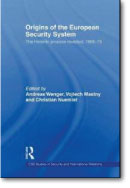Origins of the European Security System: The Helsinki Process Revisited, 1965-75

Author(s): Andreas Wenger, Vojtech Mastny, Michael Cotey Morgan, Jeremi Suri, Marie-Pierre Rey, Douglas Selvage, Federica Caciagli, Bernd Schaefer, Daniel Möckli, Petri Hakkarainen, Floribert Baudet, Christian Nünlist, Duccio Basosi, Helga Haftendorn
Editor(s): Andreas Wenger, Vojtech Mastny, Christian Nünlist
Series: CSS Studies in Security and International Relations
Publisher(s): Routledge
Publication Year: 2009
Publication Place: London, New York
